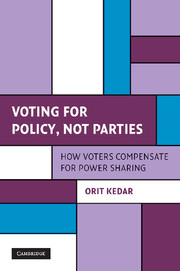6 - Conclusion
Published online by Cambridge University Press: 19 January 2010
Summary
SUMMARY
This book analyzes voter considerations under various institutional regimes. The key principle driving it is simple: voters are concerned with policy, and their vote choice reflects the institutional path that shapes policy formation. This simple principle carries broad implications both for voter choice and aggregate election outcomes, and provides a unifying explanation for a variety of empirical regularities in electoral politics.
I focus on three electoral arenas: parliamentary, presidential, and federal democracies. In the parliamentary arena, the institutional path of post-electoral compromise passes among parties in parliament and between coalition and opposition. A variety of mechanisms and practices facilitate power-sharing and compromise among these actors. This path, I show, is reflected in voter choice. Knowing that their votes will be diluted down the line, voters often overshoot and support parties that diverge ideologically from their own views. How much do they overshoot? Importantly, the degree of compensatory vote depends on the degree of power sharing facilitated by institutional mechanisms. Drawing on cross-polity institutional variation, I demonstrate that the more such mechanisms are present, the more voters support parties whose positions differ from their own views. Where the process of policy formation is consensual, voters compensate. Where it incorporates policy inputs of fewer actors, voters stick with parties ideologically similar to them. Finally, polities characterized by a high degree of compensatory vote are also those in which a smaller proportion of voters support parties ideologically closest to them.
- Type
- Chapter
- Information
- Voting for Policy, Not PartiesHow Voters Compensate for Power Sharing, pp. 181 - 196Publisher: Cambridge University PressPrint publication year: 2009

